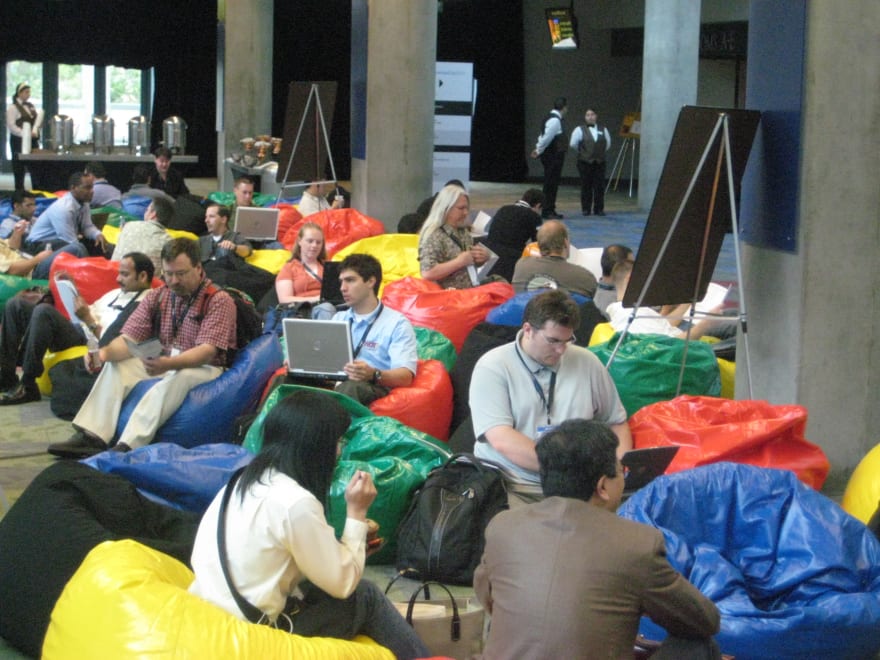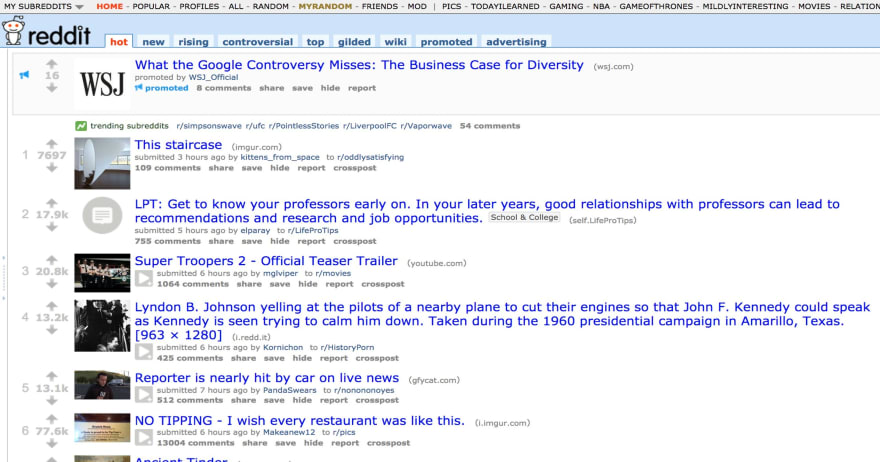I never thought I'd be a remote worker. Growing up in the 90s, I saw my dad go to work with his briefcase and get home every day around the same time. There was no talk of "work" once he returned home. I thought clocking in and clocking out at a place you called "work" was the norm and that was going to be my life once I graduated college. I never saw this type of employment as "good" or "bad," it was just the way things were back then.
I wanted to reflect on how I became a remote worker, and how I can't see doing "work" any other way.
Updating spreadsheets on a hallway floor
I started my career as a financial analyst, and remember visiting New York for a few days just because I wanted to see some friends. My team was based in San Francisco, so I still had to work west coast hours. I stayed at a friend's place and still remember vividly sitting in their cramped apartment hallway at 11PM updating a spreadsheet that needed to be uploaded to the Oracle server.
Back then (~2008), laptops did not necessarily have a Wi-Fi component built into the hardware, so I had this USB stick that could pick up Wi-Fi or tap into the data plan my team had. Of course, updates were super slow and I just sat there waiting for the changes in my spreadsheet to finish uploading to the server. In that moment, I realized my "work" was simply updating a database by a due date (month-end close). It didn't matter where or how I did it--as long as it got done that's all that matters to my team and company.
Bikes and bean bags
The company I was lucky enough to work at was Google. Google's interior design is unlike most companies. Everything from the snack kitchens to commons spaces are playfully designed making the workplace a really fun place to, well, work. Common spaces would be filled with chairs, couches, and bean bags.
My first year at Google, I saw people just lounging around on these bean bags and working on their computers. At first, I thought this was insane. Why weren't these employees at their desks? Won't their bosses be mad because they don't have "face time" with their subordinates? This was just the culture, and employees can work wherever they feel comfortable as long as the work gets done.
The headquarters in Mountain View is a sprawling campus of buildings. If you had a meeting on the other side of campus, you would have to budget 10-15 minutes to take a shuttle to the other side of campus, or jump on a bike and put your laptop in the little basket on the front of the bike. I would kind of play it by ear on whether or not I should go to meetings in person to save time on the "commute," but I could easily dial into a meeting with Google Hangouts from some other conference room or from my laptop (while sitting on a bean bag, of course). I got all the information I needed to do my work, and saved 20-30 minutes of commuting to another part of campus.
Scratching the entrepreneurial itch
After I started pursuing my own startup and doing freelance work, I found myself bouncing between coffee shops, the public library, and my apartment. I realized I could also travel and get work done as long as the hostel or apartment had Internet. The best part about this period of my career was I discovered 3 skills that have helped me to this day:
- How to learn digitally
- How to communicate digitally
- How to write proper documentation
I started taking online classes to pick up quick skills on web development. I learned some of the nuances about posting in online forums and writing blog posts. As I scaled my company, I focused on writing good documentation outlining our processes and systems. Whenever there was a problem to be solved, I instantly think about solving the solution digitally. I think this was one of the best parts about going off on my own: learning to solve problems without a company to support you when you mess things up. I had to be scrappy and cost-efficient, and the best way was to use as many online resources as possible.
Developing skills for remote work
Despite all the trends pointing to more companies moving to remote work, there will always be people that need to go to a physical office every day and have face time with their colleagues and management. On the flip side, your personal circumstances may force you to be a remote worker, and you'll have to develop these skills as best you can since you don't have a choice. Here are my tips for gaining the skills to be a solid remote worker:
1. Observe employees at other companies
Just like my initial experience seeing people working on bean bags at Google, seeing how other companies work with remote workers can broaden your horizons on what arrangements are possible. An easy way to do this is ask for a tour of any WeWork and ask a few people how they get their work done. What tools do they use? How do they attend meetings?
2. Join online communities related to your industry
I used to think online communities and forums were simply places to find answers to a problem you are trying to solve (still a great resource for that!). How do you set up a Facebook Ads campaign? How do you set your Shopify store? These are all common questions you might ask and get answers to. But once you are remote, the individuals in these communities become your co-workers, to a certain extent. In addition to finding answers to questions about some esoteric problem, online communities can expand how you think about your work and give you a chance to connect with another human (albeit digitally). The Digital Nomads on LinkedIn group is a great place to start if you want to get more tips on working remotely.
3. Write detailed and thorough documentation
If you have colleagues, this is probably the #1 skill I would prioritize. How many times have you been asked something like this on Slack: "Hey Bob, what is the process for uploading pictures into our CMS?" You could easily respond over Slack, but that isn't scalable. Creating a document or wiki where you detail the process for saving the image, logging into the CMS, and inserting the image means every single colleague and future employee has one single source of truth to understand your process. This skill extends to documenting meetings, decisions made, customer interviews, and more. Think about all the online SaaS tools you use. Whenever you have a question about how something works, you might Google the question, and the best SaaS tools have great documentation that gives you step-by-step instructions on how to fix your problem.
Creating routines and consistency

One observation I've seen at other companies (including my own) is people will go to work at a physical location, and then put on noise-canceling headphones to get their "work" done. I'm not going to get into the whole debate around open workspaces, but there's a lot of talk these days about getting into a flow state or "the zone." This usually means being engulfed in your current task and not being interrupted while you work. By creating that environment where you can work uninterrupted for a long period of time, you gain more consistency with getting your work done effectively.
I still enjoy the routine of going to my office (a co-working space), having a desk that I can call my own, and my go-to lunch spots around the office. On the spectrum of one end of needing to go into the office every day for face time, and the other end being a true nomad where your location changes every day/week, I would fall somewhere between the middle of the spectrum and the complete nomad extreme. I cannot fathom needing to go to an office every day for face time, nor can I see myself traveling every day where I'm not sure if the Internet is stable to get my work done and I don't know where I can get lunch. There is still a semblance of a daily routine where I've found I can get the maximum output while still enjoying the benefits of remote work.









Top comments (0)